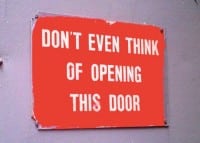We spend time being ‘busy'. Busy marketing on social media. Busy networking with fellow writers. Busy submitting manuscripts to publishers.
You know what we forget? We're writers. We need to write!
One of the things I found early on was that I, apparently, write pretty fast. Joe asked me the other day how I'd already written more than four novels in my short writing career.
I laughed. Why? Because I thought I was going too slow. You see, my goal is to write a lot. A lot, a lot.
So how can you write a book starting now? Try F.A.S.T.
Want to learn how to write a book from start to finish? Check out How to Write a Book: The Complete Guide.
1. Forget The Rules Placed On Your Craft
I'm lucky because I don't come from a classically trained writing background. You see, if you've grown up wanting to be a writer, and you've taken courses, majored in writing, had Pulitzer winning professors, etc…along the way you've been told rules over and over again.
Do these sound familiar?
“You can't make money writing.”
“You have to take a lot of classes.”
“You have to major in English or Creative Writing to write a novel.”
“A book takes at least 18-months to finish.”
…and on and on and on.
If I'd listened to what people had told me, I wouldn't have clicked one keyboard key in pursuit of my dream.
How can you do the same?
2. Aim For A Weekly Goal
I started out with a daily goal. That's great if you can swing it, but you know what? Life gets in the way. It's impossible to ignore the wife, kids, and bills to write all day.
Now my goal, when I'm on a deadline, is 10,000 words per week. That means I can write 2,000 words on Monday, 1,000 words Tuesday, and so on. My writing fits into my schedule, but I still have that weekly goal to hit.
By hitting my weekly targets I've been able to achieve my larger goal of writing each novel in just two months. Not bad.
3. Set Your Routine
I have a set way of writing novels. I always wear noise canceling headphones with a soundtrack playing that I specifically created for the novel I'm writing. I always bring my Costco green tea to drink. I always have a protein shake and a stick of cheese in the same little grey cooler. I always write during the middle of the day.
My routine puts me in the zone. It's my safe place. When I sit down to write I just write. I don't have to worry about what I'm gonna eat or if I'm properly hydrated.
You should do the same. You don't have to be completely anal about it. The simple act of writing in the same place each day can give you the comfort you need to speed down the path to finish your book.
4. Train Your Brain
I didn't know anything else. Sure I wrote essays and stories in grade school in college, but I made my system up. My goal is to write six novels every year. That's one every two months. For me, that's very achievable.
You might be different. Your current pace may be only 1,000 words per week. Train your brain to double that number. Triple that number.
Exceed your prior expectations and crush your self-imposed limitations.
Rewrite Your Rulebook
You might be a super prolific writer. You might be the slowest writer on the planet. What separates you from the other guy or gal? Talent? CPU speed? A better dictionary?
I say it's all mental. If you believe you can write a book in a month, you do it. If you've heard that books take twenty years to write, why are you listening?
Make your own rules. Get your art out there. Your readers are waiting. (Share that?)
Where will your career go if you rewrite the rulebook?
PRACTICE
For fifteen minutes write about what your writing career will look like in ten years if you ignore the advice of all the “experts” out there. Dream big.
When you’re done, post your practice in the comments. As usual, be supportive by giving feedback to others’ practices.








My goal is to write a novel a year — even though I write one every November –NaNoWriMo is my passion. To listen to the experts say — and I attended a several – night class, if you will, with a rather well known published author who began writing Western romances and has morphed into Victorian mysteries who told us to go home and forget about writing because the competition was too great. (Like she was the last writer allowed in the club?) I listened and thought about it. What I got from that is that I should not write romance novels. They’re too dull (exception: those of Kathleen Woodiwiss) and I don’t buy the romance formula. Then I happened on Chris Baty’s No Plot? No Problem! in the library and read it cover to cover. I learned that first, write the darn novel! Do it! and second, believe in that novel and polish it and see what you can do. Granted, I just finished polishing one and have it ready to go. It’s still here. But I’m working on two right now. Being able to write with wild abandon is the way to go. Forget about getting each word perfect and just write the thing! Let it be your own little story of whatever you like. If no one likes it, at least you wrote it!!!!
Jamie, you make some great points. I still can’t believe that author told you to forget about writing. Can you say curmudgeon?
Dead on with your thoughts about just writing. I don’t go back until the last word is written. Thanks again and keep writing!
Jamie, if you (or anyone else) want to write romance, write romance. I avidly read this genre and it continues to grow and many of us romance readers are open to new, indie authors. Romance has more readers than all several other genres put together. Go on to Goodreads, check out some romance novels and you will see what I mean. Entire groups are dedicated to the genre, some dedicated to just one romance author and that author’s novels. I doubt anyone but fans of the genre realize how vast it is, or how many talented writers the genre has. Of course, the genre is not for every reader or writer, but that is true of every genre. And as you’ve pointed out, if no one likes it, buys it, reads, it, at least you wrote it!
I stumbled upon that book a few years ago working at a Barnes & Noble! Finally read it last year, and I quote it all the time! That book really helped me! This November will be my very first NaNoWriMo!! I can’t wait! I keep telling everyone, “I have two months to complete this book I’m working on, because November is drawing near!!!” You cannont go into November with a half completed book! Must start at the beginning of something new! I think Chris Baty is a genius. I’ve yet to publish anything, but I have two books written and in the editing stage. I’m half through the first book of a series I just started, and I have a couple other books I’ve been dabbling in for a while. I live by the write-now-worry-later rule! And I’m lucky to have an amazing family and wonderful friends who made it possible for me to write full-time for the past few years! They believe in me, and that keeps me going.
Finally, a writer who I agree with 90%! I disagree with the speed thing, though. Everything else, I completely agree with the rest.
Isn’t always about speed. I can write 7000 words in a week easy, but that goal doesn’t take into account editing. I edit my chapters as I finish them.
It is also way too easy to waste hours on social networking. I hate when I do that. Most of the time, I’m unsure it is worth it. But then again, I’ve found a couple of good critique partners that way.
Wasting time is my big thing. How much time do we waste not writing?
We waste too much time not writing. Part of why I help others is so that I learn the same basic lessons over and over. It’s so easy to get distracted with all the latest gadgets and gizmos. I always have to ask myself “How much have you written today, Carlos?”
Thanks for the comments, James!
Yes. And I found that much too many days I find the answer to the very question is, “Not enough”.
No problem. I also think reading speed is becoming an important factor for me, and maybe others as well. I’ve always been slow at it. I spend quite a bit of time reading and critique others work and social networking is also a lot of reading.
Here’s my thoughts and tips on speed reading:
http://vozey.wordpress.com/2013/08/16/speed-reading-3-how-to-change-the-world-of-entertainment/
I’m bound and determined to get a reading speed over 500 words a minute. Then, I’ll try for 1000.
Thanks, R.W. I’ll take that 90% 🙂
Like I mention in the post, speed and time are relative. I just want writers to realize that writing a book doesn’t have to take forever.
Thanks again for the comment!
Lol. I think they do now. Your words really resonated with me. They probably will with the others.
It’s not easy being a writer.
From the get go, I knew it wasn’t going to be easy. I learned how to write
from mere entertainment; I won one talent show and I envisioned myself winning
some sort of award. When I was ten, I wrote a novel without a plot. When I was
eleven, I figured out that I needed one to be a great writer. Today is my
birthday—I turn thirteen today. I don’t know what awaits me out there, but I do
know I can’t just stand here and wait for something to happen.
I don’t live in the United States. I can’t speak or write my native
language that well. Whenever I tell my friends about my dreams, they’ll always
give me strange looks, asking if I could get a publisher here, in my home land,
if I can only write in a foreign language (if you haven’t figured it out,
English). For some time, that bothered me. Then I began realizing I had bigger
problems to worry about. I would sometimes read old stories in the newspaper,
and I would realize that their language, writing, and story telling is far more
impressive than mine. They were more creative than me, more witty—I couldn’t
possibly match them. But I want to. I really do.
There are days when I want to give up. There are days when I want to just
throw the towel and leave it at that. There are days that I sometimes wish I
aspired to do something easier. But then, there are days that I realize that
there isn’t anything easier. That anything else I tried to do wasn’t fit for
me, no matter how easy. I was, by a slight chance of fate, a writer. I’m not
sure if I can do anything else without wanting to do what I love.
Ten years from now, I want to be something big. Not a big name, no, but
something of a big story. I’ve got a ton of them in my head, but I’m not sure
which one will be that ‘big story’. Maybe none of them are. Maybe someone will
give me an idea bigger than the ones I’ve thought of. Maybe I’ll dream of
something bigger. Anyway, that doesn’t matter now. I can dream big, but that’s
all that they’d ever be if I did: dreams. It’s not best to let dreams be just
dreams. I wish to make them realities.
I think that you think too much. I am a writer and I don’t even write fluently in English. Here in our country, people LOVE watching tv or surfing the internet more than they love reading a good book. I also have the same fears (I call it paranoia now) before and then one day as I googled writing communities and blogs for writers (like this one), I realized that in our Universe (I call it the Writer’s Universe when each of us claims or create or re-create our own planets, asteroids and stars), we just wanted to pursue another scared, anxious, and hesitant writer to write his/her story. Doesn’t matter if it’s a big story, now. Doesn’t matter if we are not fluent now. Doesn’t matter if our writing voice sounds scared and unrefined (doesn’t even matter if that voice rings in three different pitches!). Just write. Because you are a writer and writing is what we do, whatever.
Good luck to you and I hope you write your story soon. If you are like me, your characters might be bugging you even in your dreams just to be written. 🙂
Also remember that writers whose home language isn’t English bring a new cultural bias into their writing, which makes it unique and interesting.
The only difference between a dream and reality, is the steps to get there. Set goals.
Your 13, dream big. I turn 27 in a few months, I’m still dreaming. But since I have defined how to get there, I can see that I’m making progress towards those dreams.
I know how you feel. First step, stop comparing yourself to others. You need to find your own voice. You are unique and so are your stories. Start with short stories and see where it takes you. Do free writing like we do on this site.
But you’re also only 13. You’ve got time. Don’t waste it worrying.
Don’t forget to live life. That’s where your stories will come from. Stop listening to others. Keep your eyes on your dream, put one foot in front of the other and move forward day by day. We’re here to help 🙂
I think I must be the slowest writer on the planet. My biggest problem, I think, is making writing a priority. I set goals, but I usually don’t meet them because I let other things get in the way. Not to mention that whenever I do make time to write, it’s usually to work on an outline for something I’m GOING to write, or a blog post, or I sit there staring at a computer screen trying to get it perfect the first time around. There was one time I set a major novel goal and stuck with it though: last November, I wrote a novel for NaNoWriMo and hit the 50,000 word mark in 30 days (and finished it at 64,000 in 40 days). So I know I CAN do it. It’s just a matter of making the time and focusing myself and keeping to my goals.
It would be totally awesome to finish a novel in two months on a consistent basis. Did you completely finish your books in that time, or just the first drafts? Either way, great job!
Sarah,
At least you know you can do it. A lot of people I talk to just talk. They say they’ll do it and never do. Your only stumble is going the extra step. What did it for me was Jeff Goins’ book “You’re A Writer (So Start Acting Like One)”. That was the kick in the rear I needed.
As for your question, I finish the first draft in two months then let it sit for a week. Then I print a hard copy and take two days to red pen and make the digital changes. Then it’s off to my editor who does the heavy lifting. Meanwhile I’ve already started my next novel. I’m always pressing forward.
Thanks again for your comments!
I like that idea Carlos: printing a hard copy and laying the red pen to it. Great advice all around Carlos.
Thanks, Debra!
Thank you for writing this article, it really boosted up my spirits! 🙂 Here is my very first “practice”.
In ten years, when I am twenty-five, I will have several of my books out into the world. I plan on writing
out my work-in-progress, then plan on writing out a sequel. After that, I see
myself going into different genres (I am currently writing realistic fiction),
such as supernatural romance and religious text. A dream of mine would have to be to have around ten of my books out into the world by the time that I am
twenty-five, having had written out my work-in-progress and its sequel before I
am done with high school, in three years’ time. I hope I will be published
before the age of eighteen, and if not, at least by twenty or twenty-one.
I also hoping to have a blog by then and to be on the
list of bestsellers. I don’t really care about the awards or the money, but I would like it if my books were among the section where they sincerely inspire a lot of people, and maybe not by the age
of twenty-five, but maybe by the time I’m thirty or so, I can have at least one
movie contract for one of my books. I would like to see the difference in
response when it comes down to an audience of viewers versus readers.
There isn’t much more that I would like
to do writing-wise by the time I am twenty-five, but I have a feeling that I
will have like fifteen to twenty journals by then…Thanks for reading. ~K. R.
Good luck on your journey, Karla! Just keep writing 🙂
Thanks for sharing this article! Lately I’ve gotten so far away from my writing I thought I’d lost my groove, but these tips are easy and doable.
These tips are really fantastic. I already doing some, but I think adding a few more from your list can really help me amp it up. I’m naturally a pretty slow writer, so that’s pretty exciting,
Thanks, Emily. Nice post today 🙂
Now back to writing…
Here’s what I hope to be writing ten years time. A bit of a fantasy? Perhaps.
Show, don’t tell.
Keep to one p.o.v.
No adverbs, or adjectives.
Nah! Throw the rule book out. Look at Edgar Wallace – he wrote non-stop then sent his first draft to the publishers. Perhaps his day job as a reporter helped him get it right the first time.
Look at Jeffrey Archer, whose books sell by the millions; he never shows where he can tell, suffers from severe cases of adjectivitis, and adverbemia.
It wasn’t easy throwing out all those rules drummed into my head at the many writing workshops I attended religiously. (See there, an adverb!) I realised early on that some of the best stories I ever read were badly written.
But well told.
What is a breakout novel, but one that rewrites the rules? In these days when our senses are bombarded by radio and TV, with their subliminal images and hidden prompts, live advertising boards on roads and pedestrian walks, smartphones, and robot home appliances, I had to first build a wall against all this, then train my mind to adjust to the brief but all-encompassing attention span that this modern age has produced.
My shortest works appears on TV in the advertising breaks and on smartphones for reading in a queue. But they’re not real books, you say? I write those too. I’m like an athlete who’s trained for the sprints and the marathons.
It’s the formula. I’ve thousands of files in my PC of writing rules and advice gleaned over ten years. Strictly speaking, the rules haven’t been thrown away; they’re all filed away in my head, internalised, and modified to meet the new demands of the reading public. As I write my synapses make the right connection in a flash of a second.
The rules still apply, but in the right places. They’ve been largely replaced by a mindset that optimises shortcuts and byways to cut hours off the writing process.
After the writing boom that seized the public in the late 2000’s, that intense focus accelerated writers’ learning curve as the advent of digital publishing put the printed word in everybody’s hands. I’ve written best-sellers, every one selling millions, but the bar was shifted upwards so many times as the market grew by leaps and bounds as sales volumes ballooned. The spread of English as a universal lingua franca must also be given credit. (Or share the blame. Non-readers complain about readers’ anti-social habits.)
.An interesting side-effect has emerged from the publishing revolution. Older, established writers have become multi-millionaires, something they themselves never foresaw.
It became difficult finding your way among the many new writers that emerged that reputation became the main selling point. Digital books are ridiculously cheap, but people are prepared to pay for quality.
In a few years I hope to join that select band.
I must confess. I’m still addicted to the old printed word. Often I’ll take down an old tome of one of my favourite authors and slowly read through it, breathing in that smell of ink on paper, feeling the comforting weight of the book in my hand and the texture of the paper as a I turn a page.
Love it! You put me there 🙂
Your first couple paragraphs reminded me of something I learned early on. Find your audience and write for them. My audience aren’t college professors. My audience doesn’t take well to fluff. My audience wants a good story they can finish in a weekend or less.
Thanks again for your thoughts, Winnie. Can’t wait to ride the wave with you!
Thanks Carlos. I’ve printed out your article to pin up on my wall when I have (another) go at a novel.
I totally agree with throwing away the rule book – more often than not it stops writers dead in their tracks, mostly from sheer panic at the seeming impossibility of it all. Nice post, thanks.
Thanks, Jon. You’re right. It’s like looking up at the Great Wall of China after someone told you to climb it without using any tools or your hands and feet. So many would-be writers handicap themselves from the start.
This is quite fun since I am doubting if I’ll ever be a legit writer someday. After reading this, I’ve decided to make it a goal to start and maintain at least one Wattpad novel. For this year, at least. I think for me to be able to do that is already a big achievement since I’ve been trying and trying to do that for years but I wasn’t able to accomplish anything. In ten years, I see myself really enjoying writing novels and short stories. I do enjoy writing but several factors won’t allow me to revel in writing. More like, I’m not yet strong enough to ignore those things that hinders me to write. I always end up deleting works I’ve already started. I can be very critical of my own work in a way that instead of me learning from my own criticisms, I end up being discouraged. I think that really has to change. Don’t you think?
This is my first participation ever. I’m kind of nervous.
Form what I’ve seen and heard the big secret is to keep going. About that internal editor that keeps nudging you to delete – before I start on a blank page I alway get a big stick and beat it into silence. Good luck.
Yeah… I really need to tame my internal editor. It’s way too bossy already. Haha. But I think that’s the biggest hindrance I have whenever I’m trying to write. Thank you very much Winnie!
Thanks for joining in! If I can offer one thing it’s to just write. It doesn’t matter what it is or how long it is. Fight the urge to go back and fix anything. Do that over and over and you’ll soon find that looking ahead is much more appealing than being dragged back.
Keep at it and stick around The Write Practice. We’re here to help!
Thank you very much. The article is already a big help and your advice is a bonus. I think I’ll be here often. Maybe in the next few days, I can share some stories and participate more in practices! Big thanks again! 🙂
hi guys! Just stumbled into the conversation and I am so blessed and happy with it! Thanks! Seems like the stumble part happens before midnight. As I am a beginner writer, my goal is to finish my Hanna Snail/Slak stories by first printing a set of postcards. That finally done, I can concentrate further on how to blog. Overcoming the writer’s blog/bloc LOL. Seems that my writing has been directed to another niche that I love- Coffee Shop and coffee. So I did a website for our local Coffee shop and keep the Social media on track- I think it helps me to get the thoughts in order, sort of….
Good stuff, Hanna. Remember the first rule of being a writer: Write 🙂
I’ve gotten distracted by side projects along the way. I have to put the blinders on and get back to my laptop. Good luck!
Thanks Carlos- so back to the Notebook/laptop 🙂
This post hit so close to home. I’ve been writing since very, very young. Have two advanced degrees in creative writing, led by brilliant writers. And of course, they taught me a lot. But they also taught me the rules, which have just resulted in me being completely paralysed. Now I work in advertising, and every single day I wonder why I don’t write anymore. It breaks my heart.
Just write. We want to hear what you’ve got 🙂
I will! thank you for your kind words and encouragement!
Seconded. Write write write write write.
I think that ought to guide her emotions come and go as you like and then create their own books to pace yourself. because I never want to finish it quickly and bring a good book, do not expect the reader
Thank You Carlos You is a g!!
Hmm.. my technique is completely different. I write every day, and I share my chapters online on different forums and blogs. I like it when people comment and are part of my creative process, it keeps me motivated. I write between 2 and 3k in a day. But I could probably write 10k a day if I really straighten myself out and apply more discipline. However I constantly go back, read over what I wrote, and also re-plan and re-map the story while I write. I have an idea at the beginning, but all too often the characters take on a life of their own and go off on their own and this is where it gets interesting. Many twists and turns in between cause me to branch out, etc. So I think to plan something so rigid, like say, I have to finish in 2 months would scare me and also might stifle my creativity…. It takes a lot of mental energy to make up a novel. I mean I can write any novel in just 2 months, but is it going to be good? Quality over quantity is my measure…
I’m working on my fourth book since January 1 of this year. Granted, I’m a student with a comfortable, introverted social life, but I’m still very proud of my work.
Now, if only I could get an agent…
For me the permission slip came from Stephen King’s ‘On Writing’ which I read once a year just to refresh that little voice in my head that whispers ‘make some magic, do it however you like…’
I can write a 20,000 word book in a day. I do 1,000 every 25 minutes. All you have to do is clear your schedule for a day. Go in a quiet area and write. I type fast so for others it may be different. I also Don’t always meet my goal because of writers block so I add 5 minutes. Its like a internal competition.
my goal is towrite my own life sory basic on my life and where i come from
I’ve written 7 books. I actually used your formula without realizing that I was using it. I like the way you codified it. It’s help me figure out what worked and repeat it. This post was insightful and will help anyone who pays attention to your suggestions.
I need to finish 3000 books as soon as possible as the titles are finalized, within a month. SGOC PUBLICATION.
AND HOW to get speedy copyriGht with ISBN.